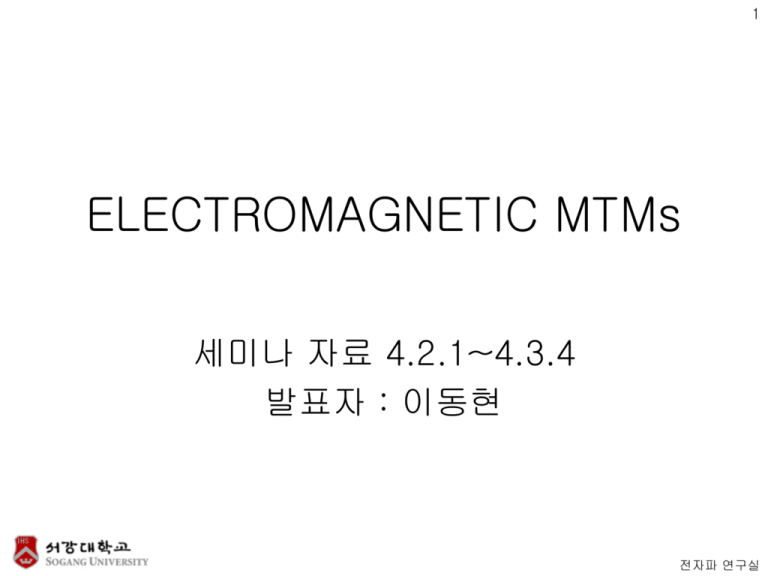electromagnetic mtms 세미나 자료 4장2점1 부터 4장3점4 까지
advertisement

1 ELECTROMAGNETIC MTMs 세미나 자료 4.2.1~4.3.4 발표자 : 이동현 전자파 연구실 4.2 DRIVEN PROBLEM BY THE TRANSMISSION MATRIX METHOD (TMM) 2 ☞ 새로운 분석 방법 TMM(transmission matrix method)을 배우는 이유 infinitely periodic size(혹은 전기적 길이가 매우 짧은) MTMs ⇒ 분석이 용이하다. ⇒ sourceless, eigenvalue problem ⇒ section 4.1에서 다루었다. finitely periodic size(혹은 전기적 길이가 매우 긴) MTMs ⇒ section 4.1의 방법으로는 분석이 매우 어렵다. ⇒ new numerical tool이 필요하다. ⇒ transmission matrix method(TMM)을 제시한다. 전자파 연구실 4.2.1 Principle of the TMM & 4.2.2 Scattering Parameters 3 ☞ 2D MTMs를 Column cell로 쪼갠다. 전자파 연구실 4 4.2.1 Principle of the TMM & 4.2.2 Scattering Parameters ☞ Column cell에 Ztv를 termination하고 transmission matrix [T]를 구한다. V1 V2 VM Vin T Vout A I C I1 I in out I2 I M VM 1 VM 2 B V2 M D I M 1 I M 2 I 2 M A B T Th Tv Th C D 전자파 연구실 5 4.2.1 Principle of the TMM & 4.2.2 Scattering Parameters ☞ Column cell에 Ztv를 termination하고 transmission matrix [T]를 구한다. A B T Th Tv Th C D Ztv Z/2 Y Z I Z / 2I Th I O I O Tv X I Ya Yb 0 Y Y Y c b b 0 Yb Yc X 0 0 0 0 0 0 0 0 0 Ya Y 0 0 0 0 0 0 0 0 0 Yc Yb 0 Yb Yc Yb 0 Yb Ya 1 1 Z Z / 2 Z tv Yb 1 Z Yc Y 2 Z 전자파 연구실 4.2.1 Principle of the TMM & 4.2.2 Scattering Parameters 6 ☞ Column cell의 transmission matrix [T]로 부터 [Ttot]을 구한다. A Btot Ttot T N tot Ctot Dtot 전자파 연구실 4.2.1 Principle of the TMM & 4.2.2 Scattering Parameters 7 ☞ [Ttot]을 이용해 [Ztot], [Stot]을 구한다. A Btot Ttot T N tot Ctot Dtot Z Z tot 11 Z 21 1 Z12 Atot Ctot 1 Ctot 1 1 Z 22 Ctot Ctot Dtot Stot Ztot / Zc I Ztot / Zc I 1 전자파 연구실 8 4.2.1 Principle of the TMM & 4.2.2 Scattering Parameters ☞ 12 X 12-cell network structure 예 Balanced CRLH case f0 1 3.18GHz 4 2 CR CL LR LL f cL 1 2 R 1 1 L 1.32GHz R f cR 1 2 R 1 1 L 7.68GHz R 전자파 연구실 9 4.2.3. Voltage and Current Distributions ☞ 2D MTMs의 edge가 아닌 inside에 source와 load가 존재할 때 transmission matrix 구하기 T T T T I in t in in Z th I T T T T I out t out out Z th I Yin Tin, A O Tin, A I Tin,C 1 O Tout, A I Tout,C Tin,C Yout Tout,C Tout, A T in, B T in, D T out, B T out, D 1 전자파 연구실 10 4.2.3. Voltage and Current Distributions ☞ 2D MTMs의 edge가 아닌 inside에 source와 load가 존재할 때 transmission matrix 구하기 I 2 Yin Vin I1 Iin I 2 I in Yin Vin I 4 Yout Vout I 3 I out I 4 I out Yout Vout Vin I I Y 1 in Vout I I Y 3 out O Vin I I in O Vout I I out Vout Vin I Tc I 1 3 I Y in Vin I I Y in in O Vin I O Vout Tc I I in Yout I I out O I O Vout V Tc TYi Tc TYo out I Yout I I out I out Vin Vout I Tio I in out 전자파 연구실 11 4.2.3. Voltage and Current Distributions ☞ 2D MTMs의 edge가 아닌 inside에 source와 load가 존재할 때 transmission matrix 구하기 Vin Vout I Tio I in out Determining the currents and voltages at any point of a 2D MTM network tij : elements of [Tio] 전자파 연구실 4.2.3. Voltage and Current Distributions 12 ☞ 앞에서 구한 수식을 사용 simulation 한 결과 전자파 연구실 4.2.3. Voltage and Current Distributions 13 ☞ 앞에서 구한 수식을 사용 simulation 한 결과 전자파 연구실 14 4.2.4. Interest and Limitations of the TMM ☞ TMM의 이점과 한계 그리고 이를 극복할 새로운 elaborate method TLM(transmission line matrix) ⊙ TMM의 이점 ⇒ 1D networks로부터 2D 형태로 손쉽게 확장 할 수 있다. ⊙ TMM의 한계 ⇒ size가 커질 경우 ill-conditioned matrixes가 출현 따라서 formulation이 unstable 해진다. (이러한 문제는 크기가 큰 matrices를 작은 단위의 matrices로 쪼갠 후 matrix inversion process를 적용 해결할 수 있다.) ⇒ TMM은 frequency domain technique 따라서 “real-life” wave propagation in time에 대한 정보를 바로 보여주지 못한다. ⊙ TMM의 한계를 극복하는 방법 ⇒ TLM(transmission line matrix) : intrinsically stable, time-domain based 전자파 연구실 15 4.3 TRANSMISSION LINE MATRIX (TLM) MODELING METHOD ☞ TLM(transmission line matrix)에 대해 알아보자. 수천 수백만 cell들로 2D MTMs가 구현될 경우 2D MTMs의 boundaries가 complex shape인 경우 Medium의 특성이 inhomogeneous인 경우 … 이러한 복잡한 2D MTMs를 다루어야 할 경우 개별 cell들의 wave properties가 최대한 단순하게 표현되야 한다. ⇒ homogeneity condition만 만족한다면 가능하다. 전자파 연구실 16 4.3 TRANSMISSION LINE MATRIX (TLM) MODELING METHOD ☞ TLM(transmission line matrix)에 대해 알아보자. X X X X X : unit length of the TL sections series capacitors와 shunt inductor를 TL 모델에 embedding하여 CRLH 특성을 재구성 할 수 있다. 전자파 연구실 17 4.3.1 TLM Modeling of the Unloaded TL Host Network ☞ TLM(transmission line matrix)에 대해 알아보자. ⊙ The key advantage in replacing the lumped element host cell by a pair of shunt connected nondispersive TLs 1. Their ability to transmit short impulses without distortion 2. Scatter the impulses at the shunt nodes according to a simple local scattering algorithm a time domain algorithm to track the propagation and scattering of very short impulses in such a network propose by Johns and Beurle in 1971 They showed that the impulses correctly sampled electromagnetic field propagation in 2D space and time 전자파 연구실 18 4.3.1 TLM Modeling of the Unloaded TL Host Network ☞ TLM(transmission line matrix)에서 사용되는 알고리즘1 크기 : 1/2 시간 : k△t+△t 크기 : 1 시간 : k△t 크기 : -1/2 시간 : k△t+△t 크기 : 1/2 시간 : k△t+△t 크기 : 1/2 시간 : k△t+△t k 1 한 port에서 다른 port로 파가 진행하는데 걸리는 시간은 △t r S k i 1 1 1 1 1 1 1 1 1 S 2 1 1 1 1 1 1 1 1 k 11r r r k 1 2 k 1 k 13r r k 1 4 k 1i i i k 2 k k 3i i k 4 전자파 연구실 19 4.3.1 TLM Modeling of the Unloaded TL Host Network ☞ TLM(transmission line matrix)에서 사용되는 알고리즘2 크기 : 1/2 시간 : k△t+△t 크기 : 1/2 시간 : k△t+△t 크기 : -1/2 시간 : k△t+△t 크기 : 1/2 시간 : k△t+△t 크기 : 1/2 시간 : k△t+△t 크기 : 1/2 시간 : k△t+△t 크기 : 1/2 시간 : k△t+△t 크기 : 1/2 시간 : k△t+△t k 1 한 port에서 다른 port로 파가 진행하는데 걸리는 시간은 △t i C k 1 r* 0 1 0 C 2 1 0 k 11i x, y i i k 1 2 x, y k 1 k 13i x, y i k 1 4 x, y 0 1 0 0 0 1 0 0 0 1 0 0 k 11r* x, y 1 r* r* k 1 2 x 1, y k 1 k 13r* x, y 1 r* k 1 4 x 1, y 전자파 연구실 4.3.1 TLM Modeling of the Unloaded TL Host Network 20 ☞ TLM(transmission line matrix)에서 사용하는 알고리즘을 적용한 예시 The network is considered only at discrete points in space(nodes) and time(steps) TLM is a discretized procedure The node voltage at time k△t is the sum of the incident and reflected impulses 1 4 1 i i i i i V 1 k node k 1 k 2 k 3 k 4 k m 2 2 m 1 전자파 연구실 21 4.3.2 TLM Modeling of the Loaded TL Host Network (CRLH) ☞ TLM algorithm을 CRLH material에 적용 To model the unit cell of the CRLH material We must extend the TLM algorithm such that it can account for the series capacitance CL and shunt inductance LL tan 2 Zs 1 p Zs j 2CL 2CL 4CL p j tan 2 j LL Z p j tan Zp 2 LL tan 2 p 2 LL p m stub의 길이는 2 로 통일 : 동기화 시켜주기 위해 전자파 연구실 4.3.2 TLM Modeling of the Loaded TL Host Network (CRLH) 22 ☞ TLM algorithm을 CRLH material에 적용 전자파 연구실 4.3.3 Relationship between Material Properties and the TLM Model Parameters 23 ☞ It is convenient to relate the parameters of the TLM model to the constitutive parameters of the MTM by considering the generic network model of 2D wave propagation in an isotropic homogeneous medium j Z j Y For infinitesimal cell size, the network equations and the 2D Maxwell equations for the TM-to-y case are isomorphic when the following identities are introduced 전자파 연구실 4.3.3 Relationship between Material Properties and the TLM Model Parameters 24 ☞ It is convenient to relate the parameters of the TLM model to the constitutive parameters of the MTM by considering the generic network model of 2D wave propagation in an isotropic homogeneous medium However, in the case of a CRLH MTM We can now determine the lumped elements that must be embedded into the TLM cell with the chosen size nm refractive index 과 Z cm intrinsic impedance 을 이용해서 m 과 m 을 표현하는 수식 Cell size 을 결정할 때 참고하는 수식( 은 wavelength보다 매우 작아야 함) 전자파 연구실 25 4.3.4 Suitability of the TLM Approach for MTMs ☞ The TLM algorithm of numerical analysis is based on a network model of Maxwell’s field equations. Faustus Scientific Corporation이 상기의 algorithm을 사용하여 commercial electromagnetic simulator “MeFiSto”를 만들었다. 전자파 연구실




